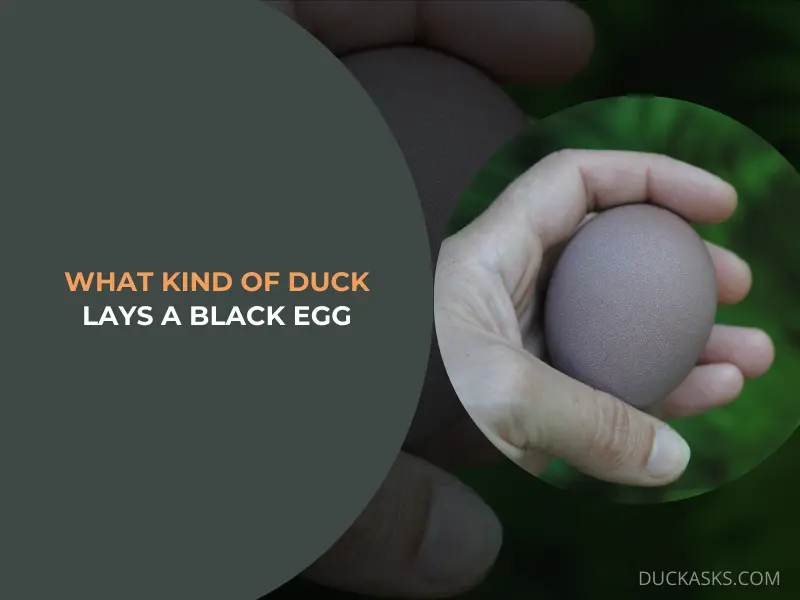Are All Duck Eggs White?
Duck eggs are not very commonly seen like chicken eggs everywhere. This is due to various reasons, like the price, taste, and size of the eggs. One thing about duck eggs that is commonly noticed is the color of the shell, which is white.
Now, you may wonder, are all duck eggs white? Well, no! Although duck eggs are mostly white in color, there are some other colors as well. Duck eggs can be grey, black, brown, greenish, and even blue. However, it is rare to see duck eggs in those different colors in general.
So, duck eggs can be of different colors with distinct breeds. Now, if you want to know more about it, you need to read along and get started now!
Want to learn more about ducks blog:
Are There Any Ducks that Lay Colored Eggs?
Ducks do not only lay white eggs, but there are duck breeds that lay colored eggs too. Here are a few breeds of ducks known for their colored eggs.

1. Khaki Campbell
Ducks that are of Khaki Campbell species are known for their excellent egg-laying abilities. They typically lay khaki-colored eggs, which are a shade of greenish brown. These ducks are mainly found in the US, Canada, and Mexico.
2. Indian Runner
These Indian Runner ducks are popular for their upright posture and prolific egg-laying. They often lay white or light-colored eggs.
However, variations can include shades of blue. Indian runners are similar to Pekin ducks as pekin eggs are also white in color.
3. Cayuga
Ducks that lie in the Cayuga species are special for their striking dark feathers. They generally lay dark-colored eggs that range from grayish to almost black. These eggs appear almost black when freshly laid but lighten as they age.
4. Welsh Harlequin
These Welsh Harlequin ducks are excellent layers of light blue or greenish eggs. This breed of duck is not found everywhere except for the United Kingdom. As a result, both these ducks and their eggs are quite expensive.
5. Mallard
In general, Mallard ducks are not that commonly seen in cities and towns. However, you can see them in the rural side of some countries.
These eggs are generally white to light blue to bluish-green in color. Mallard ducks can be commonly seen in the countryside of Europe and Asia.
6. East Indies
These East Indies ducks are a bantam breed known for their small size and dark skin. This breed of duck lays eggs that are almost black in color.
These ducks are mainly found in the US. You can also find these ducks in South America too.
7. Saxony
Ducks that belong to the Saxony species are primarily raised for meat. However, they are also quite known and popular for their light blue or greenish eggs.
These ducks are mainly found in Germany. Note that you may also find this duck in the rural side of Asian countries.
What Breed of Duck Lays Brown Eggs?
Ducks that lay brown eggs are less common compared to those that lay white or light-colored eggs. One breed of duck that is known for laying brown eggs is the Khaki Campbell.
Their eggs are typically khaki-colored. This is basically a shade of brownish green.
Note that the egg color can vary somewhat among individual Khaki Campbells. Nevertheless, they are generally recognized for their brownish-olive eggs.

The color of duck eggs is mainly influenced by diet and genetics. So, there can be some variation in egg color even within the same breed.
However, if you’re specifically looking for ducks that lay brown eggs, Khaki Campbells are a good choice.
What Kind of Duck Lays a Black Egg?
Ducks that lay black eggs are extremely rare. Only a few breeds of ducks lay eggs with very dark shells. However, those may appear almost black only when freshly laid.
Note that these eggs are typically dark shades of gray, brown, or green most of the time. Talking about this, the Cayuga duck mainly lays black eggs.

The Cayuga duck is one of the breeds known for laying very dark-colored eggs. Cayuga eggs are typically a deep gray or almost black, but they are not truly black.
The egg color may appear darker when freshly laid and may lighten over time. It’s essential to verify the accuracy of the information on such eggs.
These are exceedingly rare and likely a result of genetic anomalies rather than a standard trait of any known duck breed.
Why Did My Duck Lay a Green Egg?
If your duck lays white eggs, you will have no questions about it. However, if you see it laying green eggs, you might be surprised. So, here is why your duck may lay a green egg.
The inclination to produce eggshells containing biliverdin or lacking it is determined by the genetic makeup.

As the biliverdin increases, the greener color of the eggshell becomes. In other words, the more the biliverdin, the darker the egg color is.
Note that the dominance of green shells means that a hen possesses a prominent gene. However, if the drake does not, it is highly probable that their offspring will also carry a dominant gene.
This mainly happens with hybrid reproduction, as when another breed of duck goes for offspring.
Note that a food diet could be crucial for this too. A lot of people do not know that the diet of a duck can determine the color of its eggs. However, the extent or degree of it is not always significant.
What Factors Determine the Color of Duck Eggs?
Duck eggshell hues are dictated by genetic factors, including biliverdin and oocyanin for blue and green shades and protoporphyrines for brown and reddish tones. Breed history and selective breeding play roles too.
Some breeds carry green (G) eggshell genes, while others possess white (W) genes. Genetic diversity can make predicting egg color tricky.

There are a few factors that determine the color of ducks, as stated below.
1. Biliverdin
This is a colorant in the bile that is green in color. A bilirubin derivative has to undergo oxidation. This substance makes the egg darker. The concentration of biliverdin makes the egg color go dark.
That means the more the biliverdin, the bluer the color of the eggshell is. Note that the eggs could also seem greyish at times when the biliverdin concentration is too high.
2. Oocyanin
The substance, Oocyanin, produced by bile is responsible for making the egg lighter in color. With more of this substance, the lighter the egg color is.
Although it produces a bit of blue hues in a few species of certain birds, this cannot make the eggs dark.
3. Breeding
Duck egg color can also vary due to hybrid offspring. Male ducks generally tend to have more effect on the color of eggs than that of female ducks.
Note that duck eggs color can also vary due to factors like hereditary and the environment in which they live and conceive in.
The Relationship between Breeding and Duck Eggs Color
Through breeding, the duck egg color can vary and get a hybrid formation. Here are the details discussed below.
Genes
Genes play a very big role in the formation of eggs and offspring. A duck has two genes before giving birth, where one is its own. The other one comes definitely from the partner.
In general, it is seen that much of the gene percentage comes from the male partner. As the genes of the male partner are dominant, the color is much more dependent on that.
The white gene would be recessive and the blue or greenish gene would be dominant in such a case.
Skin Tone
Although this mainly happens to human beings, ducks have this feature too. The color of the skin of ducks can vary the egg color.
The duck’s ear area has a different color, which happens to indicate the color of the eggs. In general, female ducks have more effect on this.
Note that lighter skin makes the egg color light. On the other hand, darker ducks make dark eggs.
The Final Words
Now you have got the answer to are all duck eggs white or not! We believe you have no more confusion regarding this.
As we have come to an end, here is the last tip for you. White duck eggs are generally considered to be the healthiest and safer than other colored ones. Allergic people are less likely to have that.
So, concluding the article, we invite you to stay connected with us on Facebook, Twitter, and Pinterest. Good luck!
References:
- https://www.ncbi.nlm.nih.gov/pmc/articles/PMC6423336/
- https://www.healthline.com/nutrition/duck-eggs-vs-chicken-eggs
- https://modernfarmer.com/2015/06/everything-you-need-to-know-about-duck-eggs/






